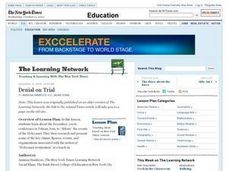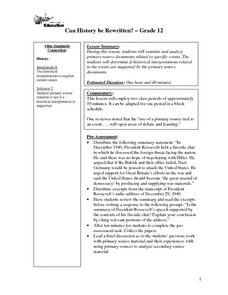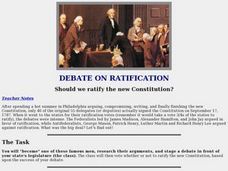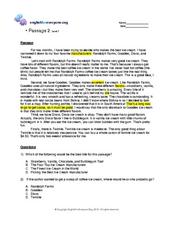Curated OER
The Lincoln-Douglas Debates of 1858: Interactive Map Activity
Students utilize an interactive map to explore the 1858 Senate campaign in Illinois. They examine how factors such as population, transportation, and party strongholds can affect campaign strategies. Students write an essay discussing...
Curated OER
The Rise and Fall of Joseph McCarthy
Students analyze documents, cartoons, speeches and articles about Joseph McCarthy and his crusade against "Un-American" activities. They guide their research with a worksheet and participate in class discussions about their findings.
Curated OER
Denial on Trial
What is the "Faurisson Affair”? What is “Holocaust Revisionism”? What does freedom of speech entail? Do revisionists have a right to voice their ideas? Such questions are at the heart of a richly detailed, thought provoking lesson...
Museum of Tolerance
The Pursuit of Democracy and Diversity: The Trial of Pro-Social Injustice in Historical Documents and Accounts
Class members investigate The Indian Removal Act of 1830, U.S. Theft of Mexican Territory Timeline, and President Abraham Lincoln’s letter to Horace Greeley, 1862, and then conduct a mock trial of each of these documents to determine...
Columbus City Schools
Poetry Speaking and Listening Standards
Celebrate April's National Poetry Month or enrich a poetry unit with a wealth of language arts material. Class members develop an oral interpretation of a poem and/or develop a podcast interview with a poet.
Constitutional Rights Foundation
Why We Have Freedom of the Press
A newspaper receives documents that reveal not only a devastating secret the public needs to know, but also troop movements that could put American lives at risk: to publish or not to publish? Using background readings, discussion...
Constitutional Rights Foundation
Elections, Money, and the First Amendment
Those who spend the most, win. Academics read informational text, participate in group discussion, and defend campaign reforms to understand the correlation between money, the First Amendment, and election results. The resource...
National Endowment for the Humanities
The Tyranny of the Majority
In American democracy, majority rules but what prevents the voices of the few from being crushed? Using excerpts from Alexis de Tocqueville's writings, young historians explore cases where minority rights were trampled upon. Extension...
National Science Teachers Association
The Ethanol Project
In a mock senate hearing regarding the development of ethanol as a fuel source, each person in the class is assigned a role to play and must uphold the stance of their character. Once the senate hearing is complete, each person writes a...
East Lyme Public Schools
To Declare or Not to Declare Independence?
Class members adopt the persona of real figures in American history, Patriots and Loyalists, research these individuals to determine their stance, and then debate the question of whether or not to declare independence from...
Curated OER
What's Legal with Music on the Web?
Student research legalities of downloading music from Internet, gather information on citizens who have been charged with downloading/copyright crimes, find out who is working to create new laws dealing with this technology, explore what...
Curated OER
Can History Be Rewritten?
Can history be rewritten? Or, more precisely, is history documented accurately? High school juniors and seniors compare primary source material with secondary sources. For example, they compare President Roosevelt's December 29, 1940...
Curated OER
The Kennedy Administration
From his inaugural speech to the Bay of Pigs, major events concerning the Kennedy presidency are discussed. Slides provide an array of images and web links to highlight some of the bigger issues surrounding President Kennedy. The...
Shmoop
ELA.CCSS.ELA-Literacy.SL.11-12.2
One way to get your class to evaluate and synthesize multiple multimedia sources is through a research project. The idea here is that class members will watch videos and listen to scientific debates in order to create a casebook about...
Deliberating in a Democracy
Cyberbullying—Lesson Plan
Learners examine cyberbullying. In this lesson on democracy, students discuss the different ways to deal with cyberbullying. They then take a position on the question of whether a democracy should allow schools to take action against off...
City University of New York
Women's Suffrage and World War I
Democracy cannot exist where not everyone has equal rights. Discuss the state of democracy and women's suffrage during World War I with class discussions, debates, and primary source analysis, in order for class members to connect...
Curated OER
To Express or Be Oppressed
Students examine the debate between free-speech and patriotism. They analyze the conflict between expression and patriotism to the throne in the Northern Renaissance, recording their responses on an Ordeal of the Artist handout.
Curated OER
Verbal Boxing
Students debate issues. For this debate lesson, students are presented topics to debate. Working in small groups, students compete in one minute boxing rounds. Resources are included.
Curated OER
Debate On Ratification
Students simulate a delegate that was responsible for the Constitution. They research their arguments, and stage a debate in front of the state's legislature (the class). The class then vote whether or not to ratify the new Constitution.
Curated OER
The Ratification Debate
Eighth graders investigate the debate in order to understand the Ratification in context of the period of history being studied. They read text answer questions through identifying the differences between Federalists and Antifederalists.
Curated OER
The Lincoln-Douglas Debates of 1858: Interactive Map Activity
Eleventh graders utilize an interactive map to explore the 1858 Senate campaign in Illinois and how factors such as population, transportation, and party strongholds can affect campaign strategies.
Curated OER
Reading Comprehension 2
You scream, I scream! Young learners read this passage about ice cream flavors, then answer 13 questions about details from the reading. The questions address details from the text, vocabulary, and parts of speech. Use this activity to...
National Endowment for the Humanities
Lesson 2: The United States, France, and the Problem of Neutrality, 1796–1801
While the French Revolution could be considered inspired by the American Revolution, it created thorny problems for the new United States. Should the United States get involved and be drawn into a European drama? Was the US strong...
iCivics
Emphasize Minimize
Encourage your class members to consider what points they are really emphasizing when they are making an argument, whether in writing or in speech. Watch out though, as this lesson may just leave your learners eager to debate you!























